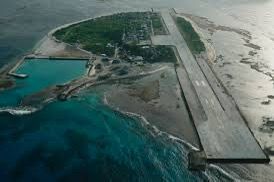China rejects PH's 'unilateral' claim to UN over extended continental shelf
By Raymund Antonio and Raymund Antonio
China rejected the Philippines’ submission to a United Nations (UN) body a request to extend its continental shelf in the West Philippine Sea to explore and exploit natural resources.

Philippine-occupied Thitu island, locally called Pag-asa island on Friday, Dec. 1, 2023, at the disputed South China Sea, is seen through an aircraft window. The Philippine Coast Guard (PCG) inaugurated a new monitoring base on a remote island occupied by Filipino forces in the disputed South China Sea as Manila ramps up efforts to counter China’s increasingly aggressive actions in the strategic waterway. (AP Photo/Aaron Favila)
In a press conference on Monday, June 17, Chinese Foreign Ministry spokesman Lin Jian said that Beijing has taken note of the submission and “we are trying to get more information on this.”
“The Philippines’ unilateral submission on the extent of its undersea shelf in the South China Sea infringes on China’s sovereign rights and jurisdiction, violates international law, including the United Nations Convention on the Law of the Sea, and goes against the Declaration on the Conduct of Parties in the South China Sea,” he stressed.
The official claimed that the UN Commission on the Limits of the Continental Shelf (CLCS) won’t qualify the submission because of the existing territorial and maritime disputes the Philippines faces with China.
“Pursuant to the rules of procedure of the UN Commission on the Limits of the Continental Shelf, the Commission will not consider or qualify the submission by the Philippines if it involves delimitation of disputed waters,” Lin said.
Over the weekend, the Department of Foreign Affairs (DFA) announced that it has submitted information on the extended continental shelf (ECS) in the South China Sea, particularly in the western Palawan region, to the UN body.
The submission is based on the country’s rights under the United Nations Convention on the Law of the Sea (UNCLOS), the DFA stressed, and would allow the Philippines to explore the seabed and subsoil beyond its 200-nautical-mile exclusive economic zone (EEZ).
UNCLOS allows a coastal state to extend the outer limits of its continental shelf to a maximum of 350 nautical miles from the baseline of its territorial sea, and grants states sovereign rights over natural resources found on or beneath the shelf.
This includes minerals, organisms, and nonliving matters in the seabed or subsoil.
If granted with sovereign rights over the ECS, the Philippines would have exclusive rights to explore and exploit the area and would disallow any other country to do so without the Philippines’ permission.